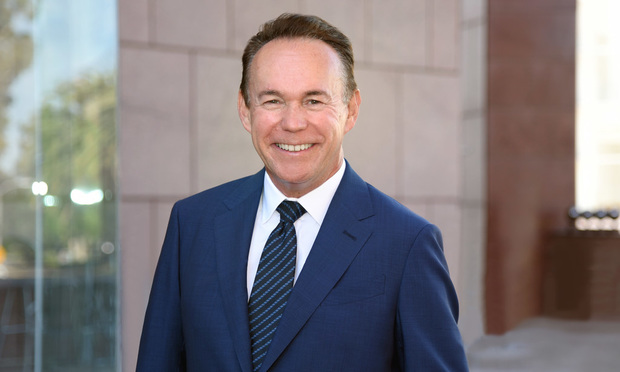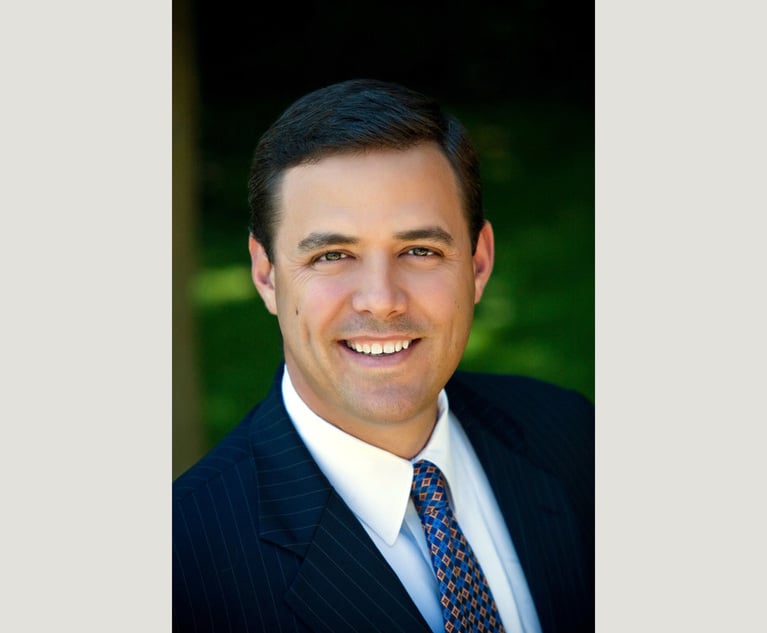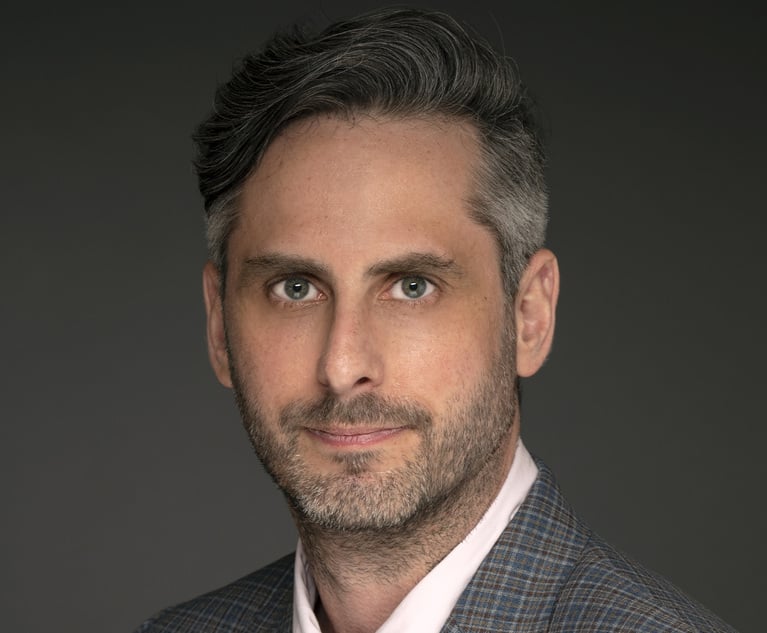Redgrave's Gareth Evans on E-discovery's Slow Crawl Evolution
As the former Gibson Dunn e-discovery expert takes the next step in his career, he reflects on just how far e-discovery still has to go.
August 09, 2018 at 10:00 AM
5 minute read
The original version of this story was published on Legal Tech News
 Gareth Evans, partner with Redgrave, in Los Angeles.
Gareth Evans, partner with Redgrave, in Los Angeles.
With new advancements in technology and updates to the Federal Rules of Civil Procedure (FRCP), e-discovery seems well positioned for a major evolution. But for e-discovery veteran Gareth Evans, the industry has been teetering on this cusp of change for quite some time. But going over the brink is a different story.
As an active member of multiple working groups of The Sedona Conference, and author of many Gibson, Dunn & Crutcher biannual e-discovery reports, Evans has been an influential figure in the e-discovery industry for years. After spending almost three decades as a partner at Gibson Dunn, the seasoned litigator has now joined Redgrave as a partner in the firm's newly opened Los Angeles office.
Evans recently spoke to The Recorder Affiliate Legaltech News about his career move, what changes still need to be made to the FRCP, and why predictive coding isn't making as big a splash as predicted. Here are highlights from the interview.
Legaltech News: Why did you choose to leave Gibson Dunn?
Gareth Evans: Well, Redgrave is the better fit for my area of focus, which is e-discovery law and information law. Working in a firm with a large team of over 20 highly experienced and specialized lawyers exclusively focused on these areas is preferable for me than to being essentially the one e-discovery guy at a large firm.
You previously noted that Rule 37(e) of the FRCP is not finding its way into many e-discovery court decisions. Do you still believe this is the case?
I should clarify. It isn't so much that rule 37(e) wasn't getting itself into decisions but that it wasn't universally getting into decisions, and there was a large percentage of e-discovery sanction cases that were being analyzed under the old law. I think it's still a significant issue, maybe not quite as bad as it was initially. But we are still seeing plenty of decisions coming out that don't reference Rule 37(e), and parties aren't penalized under the guidelines that the rule sets forth.
One of the solutions is that you need to have lawyers who are involved and knowledgeable about the rule. So I think there needs to be better education with these issues in the bar generally, and if the bar isn't interested in gaining that knowledge, then they ought to bring in more specifically focused lawyers in this area.
I think one of the things we are seeing, particularly in large cases, over the last decade is where the client is represented in a case or a governmental investigation by a number of different law firms with different specialties. So you have counsel in different areas, but you also have e-discovery counsel.
Do you believe predictive coding is catching on in the e-discovery industry?
There is an old R&B song by Billy Preston called “Nothing from Nothing.” It's not quite that bad, but from what I'm seeing it's still only used in a small fraction of cases and investigations. I agree that its use is increasing and there has been growth, but when you take a tiny fraction and multiply it a couple of times it's still a small fraction. So I think we still have long way to go in terms of the adoption of predictive coding.
Using predictive coding requires a good deal of knowledge about the process and the technology. And there could be a lot of risk involved in its use if it's not being used by a team of people consisting of the lawyers and the e-discovery technology vendors that really know what they are doing. And I think there are very few lawyers out there with sufficient knowledge about how the process works.
How would you like to see the FRCP updated in the future?
I think one particular gap should be closed. It was clearly the intention of the authors of the 2015 amendment to rule 37(e) that the rule would foreclose courts from imposing sanctions based upon the courts' inherent powers. In fact, the comment to the 2015 amendment stated that clearly. And yet there have been a number of decisions since the implementation of amendments that have recognized inherent powers to sanction.
So I think an important amendment to close that whole would be to move the statement about inherent power being precluded from the comments to the rule itself.
What is the next big challenge facing e-discovery practitioners?
I think it's going to be dealing with the proliferation of communication and collaboration tools, which includes social media platforms and applications. But it also includes all kinds of work based-applications for communication some of which involves ephemeral messaging. I think in terms of being able to identify relevant information in those applications, and to preserve, collect and search that information is going to be a big challenge in the future.
This content has been archived. It is available through our partners, LexisNexis® and Bloomberg Law.
To view this content, please continue to their sites.
Not a Lexis Subscriber?
Subscribe Now
Not a Bloomberg Law Subscriber?
Subscribe Now
NOT FOR REPRINT
© 2025 ALM Global, LLC, All Rights Reserved. Request academic re-use from www.copyright.com. All other uses, submit a request to [email protected]. For more information visit Asset & Logo Licensing.
You Might Like
View All
How I Made Office Managing Partner: 'Stay Focused on Building Strong Relationships,' Says Joseph Yaffe of Skadden

US Patent Innovators Can Look to International Trade Commission Enforcement for Protection, IP Lawyers Say

How the Deal Got Done: Sidley Austin and NWSL Angel City Football Club/Iger

How Uncertainty in College Athletics Compensation Could Drive Lawsuits in 2025
Trending Stories
- 1Bill Would Consolidate Antitrust Enforcement Under DOJ
- 2Cornell Tech Expands Law, Technology and Entrepreneurship Masters of Law Program to Part Time Format
- 3Divided Eighth Circuit Sides With GE's Timely Removal of Indemnification Action to Federal Court
- 4Former U.S. Dept. of Education Attorney Suspended for Failure to Complete CLE Credits
- 5ArentFox Schiff Adds Global Complex Litigation Partner in Los Angeles
Who Got The Work
J. Brugh Lower of Gibbons has entered an appearance for industrial equipment supplier Devco Corporation in a pending trademark infringement lawsuit. The suit, accusing the defendant of selling knock-off Graco products, was filed Dec. 18 in New Jersey District Court by Rivkin Radler on behalf of Graco Inc. and Graco Minnesota. The case, assigned to U.S. District Judge Zahid N. Quraishi, is 3:24-cv-11294, Graco Inc. et al v. Devco Corporation.
Who Got The Work
Rebecca Maller-Stein and Kent A. Yalowitz of Arnold & Porter Kaye Scholer have entered their appearances for Hanaco Venture Capital and its executives, Lior Prosor and David Frankel, in a pending securities lawsuit. The action, filed on Dec. 24 in New York Southern District Court by Zell, Aron & Co. on behalf of Goldeneye Advisors, accuses the defendants of negligently and fraudulently managing the plaintiff's $1 million investment. The case, assigned to U.S. District Judge Vernon S. Broderick, is 1:24-cv-09918, Goldeneye Advisors, LLC v. Hanaco Venture Capital, Ltd. et al.
Who Got The Work
Attorneys from A&O Shearman has stepped in as defense counsel for Toronto-Dominion Bank and other defendants in a pending securities class action. The suit, filed Dec. 11 in New York Southern District Court by Bleichmar Fonti & Auld, accuses the defendants of concealing the bank's 'pervasive' deficiencies in regards to its compliance with the Bank Secrecy Act and the quality of its anti-money laundering controls. The case, assigned to U.S. District Judge Arun Subramanian, is 1:24-cv-09445, Gonzalez v. The Toronto-Dominion Bank et al.
Who Got The Work
Crown Castle International, a Pennsylvania company providing shared communications infrastructure, has turned to Luke D. Wolf of Gordon Rees Scully Mansukhani to fend off a pending breach-of-contract lawsuit. The court action, filed Nov. 25 in Michigan Eastern District Court by Hooper Hathaway PC on behalf of The Town Residences LLC, accuses Crown Castle of failing to transfer approximately $30,000 in utility payments from T-Mobile in breach of a roof-top lease and assignment agreement. The case, assigned to U.S. District Judge Susan K. Declercq, is 2:24-cv-13131, The Town Residences LLC v. T-Mobile US, Inc. et al.
Who Got The Work
Wilfred P. Coronato and Daniel M. Schwartz of McCarter & English have stepped in as defense counsel to Electrolux Home Products Inc. in a pending product liability lawsuit. The court action, filed Nov. 26 in New York Eastern District Court by Poulos Lopiccolo PC and Nagel Rice LLP on behalf of David Stern, alleges that the defendant's refrigerators’ drawers and shelving repeatedly break and fall apart within months after purchase. The case, assigned to U.S. District Judge Joan M. Azrack, is 2:24-cv-08204, Stern v. Electrolux Home Products, Inc.
Featured Firms
Law Offices of Gary Martin Hays & Associates, P.C.
(470) 294-1674
Law Offices of Mark E. Salomone
(857) 444-6468
Smith & Hassler
(713) 739-1250






